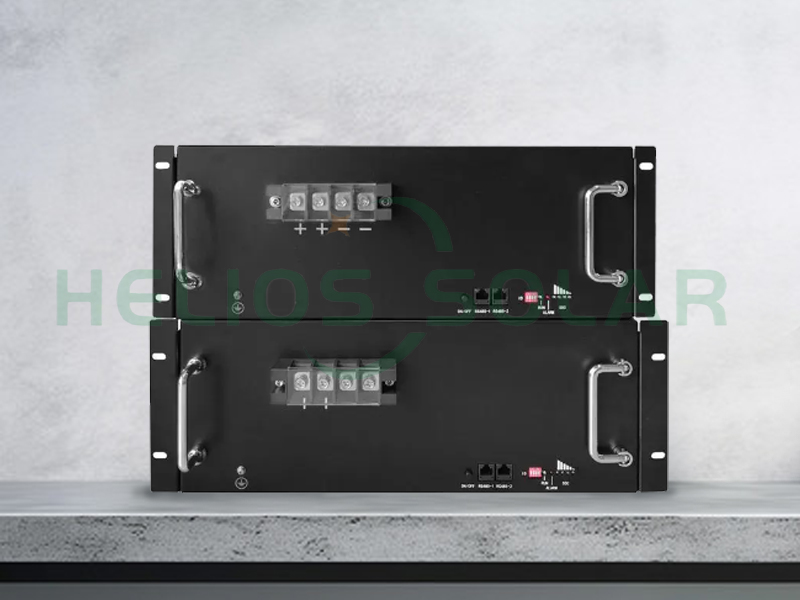In the growing field of energy storage solutions, rack-mounted lithium batteries have become a game changer. These systems are increasingly adopted by various sectors, including data centers, telecommunications, renewable energy and industrial applications. The numerous benefits of rack-mounted lithium batteries make them a top choice for businesses and organizations looking to improve energy efficiency and reliability.
1. Space efficiency
One of the most significant advantages of rack-mounted lithium batteries is their space efficiency. Traditional battery systems, such as lead-acid batteries, typically require a large amount of floor space and can be cumbersome to install. In contrast, rack-mountable lithium batteries are designed to fit into a standard server rack, allowing for a compact and organized setup. This space-saving design is particularly beneficial for data centers and telecommunications facilities, where maximizing floor space is critical to operational efficiency.
2. Scalability
Rack-mountable lithium battery provides excellent expandability. Organizations can start with a small number of battery cells and easily expand their capacity as energy needs grow. This modular approach allows companies to invest in energy storage incrementally, reducing upfront costs and enabling them to adapt to changing needs. Whether a company is expanding operations or integrating renewable energy, rack-mounted lithium batteries can scale up or down with minimal disruption.
3. High energy density
Lithium batteries are known for their high energy density, which means they can store more energy in a smaller volume compared to traditional battery technology. This feature is particularly beneficial for rack-mounted systems, as it allows greater amounts of energy to be stored without requiring excessive space. High energy density means longer runtime and less frequent battery replacement, making it a cost-effective solution in the long run.
4. Longer service life
Another significant advantage of rack-mounted lithium batteries is their longer life compared to traditional lead-acid batteries. Lithium-ion batteries typically have a cycle life of 2,000 to 5,000 cycles, depending on the specific chemistry and usage conditions. In comparison, lead-acid batteries typically only last 500 to 1,000 cycles. The extended service life reduces the need for frequent replacement, thus lowering maintenance costs, and there is less impact on the environment as fewer batteries are discarded.
5. Faster charging time
Rack-mounted lithium batteries are also excellent in terms of charging time. They charge much faster than traditional batteries, often recharging in hours instead of days. This fast charging capability is particularly beneficial for applications that require fast turnaround times, such as backup power systems for data centers. The ability to charge quickly ensures organizations can maintain operational continuity even during power outages or peak demand.
6. Enhanced security features
For energy storage systems, safety is the primary concern. Rack-mountable lithium battery designs feature advanced safety features that reduce risks associated with thermal runaway, overcharging and short circuits. Many systems feature a built-in battery management system (BMS) that monitors temperature, voltage, and current to ensure safe operation. This level of security is critical for organizations that rely on uninterruptible power supplies, as it minimizes the risk of battery-related incidents.
7. Environmental protection
As the world moves toward more sustainable energy solutions, the environmental impact of energy storage systems is becoming increasingly important. Rack-mounted lithium batteries are generally more environmentally friendly than lead-acid batteries. They contain fewer toxic substances and are easier to recycle. Additionally, their longer life means fewer batteries end up in landfill, helping to reduce your carbon footprint.
8. Improve performance under extreme conditions
Rack-mountable lithium batteries are known for their ability to perform well in a wide range of temperatures and environmental conditions. Unlike lead-acid batteries, which lose performance in extreme heat or cold, lithium batteries maintain their efficiency and capacity in all climates. This reliability makes them suitable for a variety of applications from outdoor telecommunications equipment to indoor data centers.
9. Cost effectiveness
While the initial investment for rack-mounted lithium batteries may be higher than a traditional battery system, the long-term cost savings are significant. Over time, longer service life, less maintenance requirements and lower energy costs make lithium batteries a more cost-effective solution. Additionally, the ability to scale systems as needed enables organizations to optimize their investments based on current and future energy needs.
In conclusion
In summary, rack-mounted lithium batteries offer numerous advantages that make them an attractive choice for energy storage solutions. Their space efficiency, scalability, high energy density, longer operating life, faster charging times, enhanced safety features, environmental benefits, and improved performance under extreme conditions have all contributed to their increasing popularity across various industries. The more popular it becomes. As organizations continue to seek reliable, efficient energy storage solutions, rack-mounted lithium batteries will play a key role in shaping the future of energy management.
Post time: Oct-17-2024


